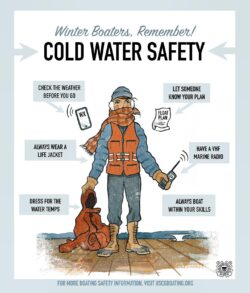Not all Winter Water is hard. Some areas remain wet year around. Depending upon the temperature and weather, ice can quickly come and go. Some areas are a combination of both.
Winter boating can be more dangerous. Floaters tend to wear more gear and clothing. If the canoe, kayak, or boat flips, getting wet in Winter could be disastrous.
Not all boaters fish or hunt. Some just enjoy the sights, sounds, and feel of the water. Even if the water is cold, it offers peace and enjoyment. Winter waterways are also less crowded. You may do an entire float without seeing another boat.
Wildlife also stacks up along watersheds during the Winter. Seeing lots of critters is always fun.
Most Hypothermia deaths occur in other seasons, than Winter. This could be because there are less boaters in the Winter or that quick temperature changes, in warmer weather, are more dramatic. Falling into a cold lake on a hot day could mean a 50-degree instant temperature swing. The shock alone could cause a health emergency. Records show that most Hypothermia deaths occur around 75 degrees or so. 
Plan on getting wet. Normally when I plan on the worst, it never happens. Prepare a dry bag with emergency gear. This should include a towel, fire fixins, change of clothes, chocolate bars, and your cell phone or emergency radio. Plan to take a practice dip. Go to an area where the water is shallow and make the boat flip. Now deal with the emergency. Have what you need nearby along the shore. Other helpers can help if needed. A cold dip will teach you a lot.
If you get wet, get to shore. Start a fire and remove the wet garments. Dry off and put on your dry clothes. Rolling naked in the snow will remove any moisture on your body if you do not have a towel. Make this a moment or so and quickly redress with dry gear. The fire will help you regain a core temperature.
Always wear floatation vests when boating in the Winter. The shock of cold water can cause you to become unconscious. Keep your body core warm with multiple vests. Avoid waders or boots/gear that can fill with water and drag you under.
Ice can be deadly when boating. If there is edge ice or ice along channels and shores, you do not want to go under it. You may not be able to come out. I once saw an entire 17-foot aluminum canoe under an ice shelf, in the Lower Madison River. I assume the paddlers made it to shore. There was evidence of a big fire nearby, in this remote area.
Pick a warmer day. Boating in a snowstorm is crazy. Make sure that you let everyone know where you are going. Carry communication. Leave a note on your vehicle with relevant information.
Winter floating can be fun but…
Montana Grant